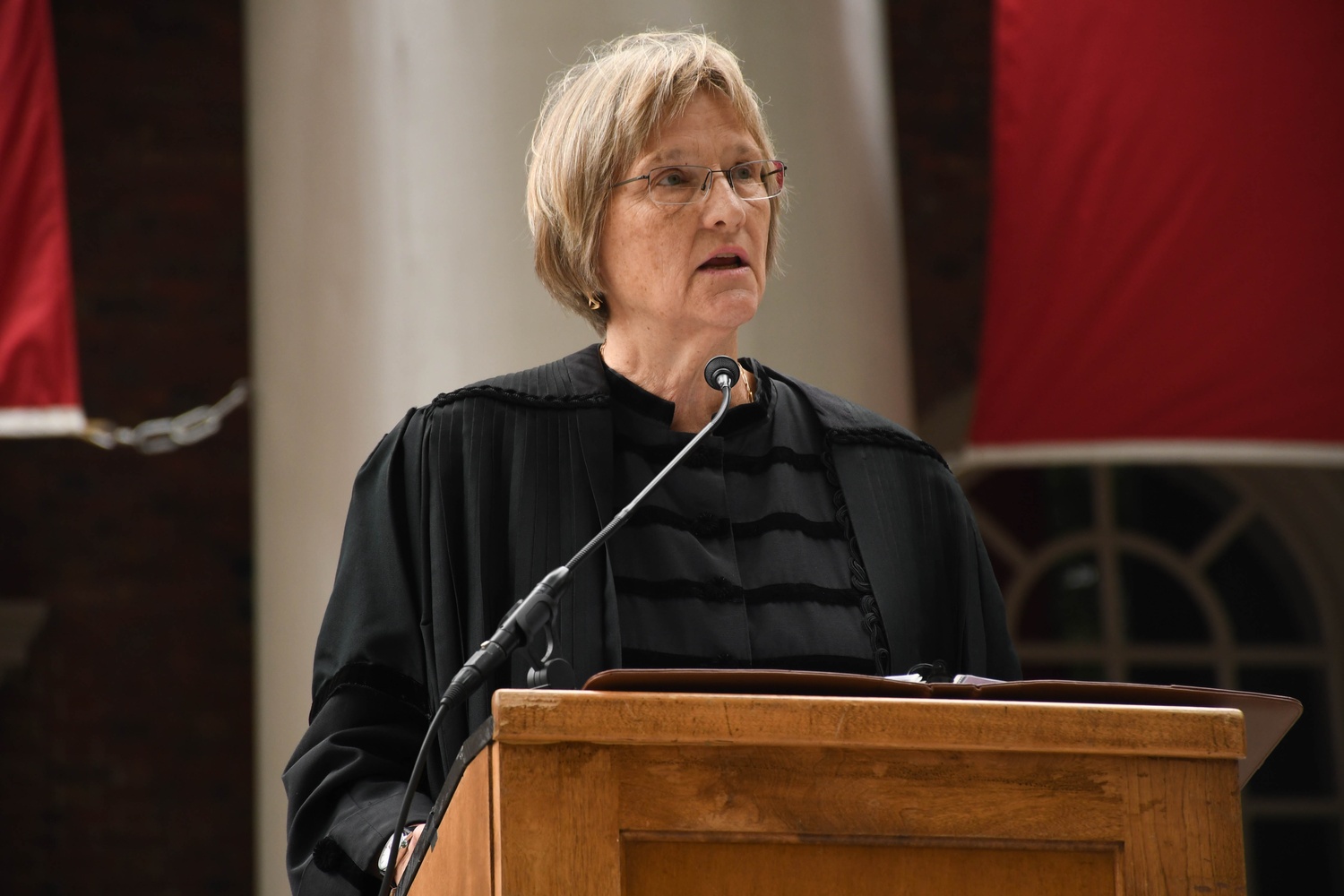
News
Summers Will Not Finish Semester of Teaching as Harvard Investigates Epstein Ties

News
Harvard College Students Report Favoring Divestment from Israel in HUA Survey

News
‘He Should Resign’: Harvard Undergrads Take Hard Line Against Summers Over Epstein Scandal

News
Harvard To Launch New Investigation Into Epstein’s Ties to Summers, Other University Affiliates

News
Harvard Students To Vote on Divestment From Israel in Inaugural HUA Election Survey
Faust Raises Concerns About Higher Ed Act’s Changes to Student Aid

As Congress moves to reauthorize the Higher Education Act, University President Drew G. Faust raised concerns about the bill’s impact on federal financial aid at a Faculty meeting Tuesday evening.
The Higher Education Act, originally passed in 1965, authorizes the federal student financial aid program, and includes provisions for programs such as Pell Grants, the Federal Work Study Program, and loan repayment plans for undergraduate, graduate, and professional students.
Faust told Faculty members that the Act would reduce student aid and support for work study.
Republican lawmakers’ proposed overhaul, called the PROSPER Act, would re-authorize Pell grants, restructure loan repayment plans, and eliminate Federal Work Study and public service loan forgiveness for graduate and professional students. The legislation passed a House committee in December but has yet to move to the full House or Senate for a vote.
Faust said that, while these provisions will likely be challenged in the Senate, the administration is trying to make sure they do not come to fruition.
The University is deploying its advocacy team in Harvard’s Federal Relations Office in Washington, D.C. to make the case for preserving student aid programs as they currently stand.
Like Faust, Suzanne Day, Harvard’s director of federal relations, raised similar concerns about the preliminary House bill in an emailed statement.
“In particular, we are concerned about the proposed changes to federal student aid programs and the potential negative impact on our students,” Day wrote.
Day also mentioned the elimination of subsidized student loans, grants for low-income students, and changes to federal financial assistance for graduate and professional students as priorities for the University.
“We are working, in coordination with our leading associations and others in higher education, to address these concerns with representatives in Congress,” Day wrote.
At the College, which touts its no-loan financial aid policy, students are less likely to be affected by changes to federal loan policies than at graduate and professional schools—though 16 percent of senior respondents to The Crimson’s Class of 2017 Senior Survey reported that they took out loans.
By comparison, it is commonplace for Harvard Law students to take out loans, and the Law School’s Class of 2016 graduated with an average loan burden of $153,172.
Under current law, graduate students enrolled in Public Service Loan Forgiveness eliminates debt for students who work up to 10 years in public service careers, such as law enforcement or public education. The new GOP bill would get rid of this program.
Kenneth H. Lafler, an assistant dean for student financial services at the Law School, said he thinks the changes to the Higher Education Act would have a relatively limited effect on Law School students, but would impact graduate students outside of Harvard. The Law School has its own loan repayment program, the Low Income Protection Plan, that is independent of federal loan forgiveness. Lafler said 681 graduates were enrolled in LIPP in last year.
“Most law schools around the country changed the way they provide loan assistance to integrate with the public service loan forgiveness program. So, the cancellation of that program would be a significant change for those schools, because they’re really dependent on that program,” Lafler said. “Our graduates are not and our program isn’t really tied into that.”
In the last year, Law School students and alumni have criticized LIPP, charging that it falls short of similar programs at peer institutions like Yale and Stanford, according to Nicole A. Summers. In Oct. 2017, Summers wrote and solicited signatures for an open letter to Law School Dean John F. Manning, asking the school to improve the program.
Lafler is more worried about a PROSPER Act provision that would nix Federal Work Study for graduate and professional students, affecting over 400 students at the Law School.
“We use federal work study to allow students to do public interest jobs in the summer. We have a program called summer public interest funding,” he said. “Work study is part of the way we fund that program. So, that would be a significant loss.”
Other experts on financial aid in higher education said certain provisions of the PROSPER Act would be detrimental to both graduate and undergraduate students.
Brian Taylor, managing director of Ivy Coach, a college admissions counseling company, said the overhaul of the Higher Education Act would raise costs for low- and middle-income college students and be especially difficult for graduate students.
“It’s going to significantly hurt middle- and lower-income students, which are exactly the kind of students that schools like Harvard are trying to attract,” Taylor said.
—Staff writer Delano R. Franklin can be reached at delano.frankin@thecrimson.com.
—Staff writer Kristine E. Guillaume can be reached at kristine.guillaume@thecrimson.com. Follow her on Twitter @krisguillaume.
Want to keep up with breaking news? Subscribe to our email newsletter.
